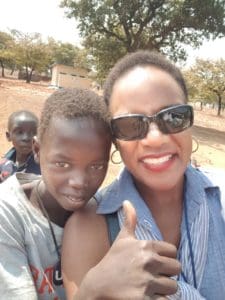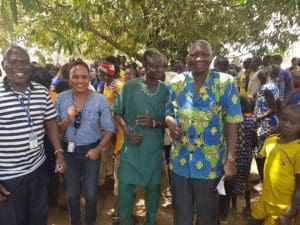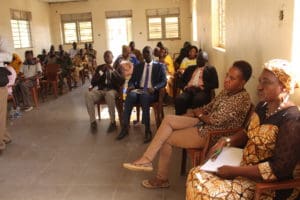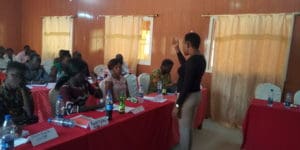Fostering Peace and Community Resilience in South Sudan. Member Spotlight: Sheila Kambobe
 Sheila Kambobe is a development professional with more than 15 years of experience working in African nations in senior leadership, advisory, coordination, and implementation roles at local and international levels. She has expertise in several areas such as results-based programme development, capacity development, policy advocacy, youth and children programming, elections, governance, and peacebuilding programmes. She is also an MBBI member and passionate ‘change-maker’.
Sheila Kambobe is a development professional with more than 15 years of experience working in African nations in senior leadership, advisory, coordination, and implementation roles at local and international levels. She has expertise in several areas such as results-based programme development, capacity development, policy advocacy, youth and children programming, elections, governance, and peacebuilding programmes. She is also an MBBI member and passionate ‘change-maker’.
Good morning Sheila, thanks for the time taken to participate in this interview. To begin with, could you tell me a bit about yourself? Your education, personal background…Who is Sheila Kambobe?
I am a Zambian woman and Development professional. I earned my education in Zambia, undertaking my bachelor studies in Education at the University of Zambia. Later on, I joined a local NGO based in Lusaka, the Christian Children’s Fund, dealing with health and education issues for children. After having spent some time working in Zambia, I had the opportunity to serve as a Young United Nations volunteer in East Timor. There, I was an Election Officer and, exactly on that occasion, I developed my interest in working in post-conflict countries, as East Timor was transitioning at the time from a conflictual situation to hold democratic elections and to run its own affairs with its own government. Before going further with my career, I decided to complete my academic education with a Master in Social Development at the University of New South Wales, in Australia. Afterward, I operated in another post-conflict country, Cambodia, before returning to Zambia. In my home country, I collaborated with various local NGOs involved with children’s educational issues and the development of less privileged communities. Currently, I am working at the United Nations Mission in South Sudan.
You worked in many different settings, dealing with the most diverse issues and particularly sensitive individuals, what then exactly pushed you towards embracing mediation?
 My interest in mediation, which partly explains my decision to join MBBI, grew when I worked in Sierra Leone for the United Nations Development Program. There my role was very specific to issues that had to do with conflict mitigation and resolution between different ethnic groups with respect to election-related disputes. In short, I was assigned to work with a commission addressing conflicts arising between different political parties and forces. This experience helped me get into the mediation world and guided me to develop key mediation skills.
My interest in mediation, which partly explains my decision to join MBBI, grew when I worked in Sierra Leone for the United Nations Development Program. There my role was very specific to issues that had to do with conflict mitigation and resolution between different ethnic groups with respect to election-related disputes. In short, I was assigned to work with a commission addressing conflicts arising between different political parties and forces. This experience helped me get into the mediation world and guided me to develop key mediation skills.
Other than what you already mentioned with the experience in Sierra Leone, is there any event or personality that inspired you to enter and work into the field of peacebuilding?
To answer to this question, I would like to go back to the time I was young, growing up among siblings as the middle child. So, I think that my position in the family prepared me for that since I was always the person in between when a conflict broke out within the family, and I was trying to represent the interests of each of my family components. In a certain way, I have always been driven by compassion, trying to figure out how could I help others in their life difficulties.
On a different side, something that really inspired me, given my personal history, is the realization that conflict in itself is not a bad thing, rather is an opportunity to build new relationships and find a common understanding. Conflict is a way to understand each other better. Thus, part of my motivation stemmed from seeking to demystify this particular conception of conflict.
At the moment you are working for the United Nations peacekeeping mission in South Sudan. How does your engagement there look like?
 In South Sudan, I am working as a Civil Affairs Officer within the UNMISS, which is focusing on multiple objectives. By being a peacekeeping mission, Civil Affairs represents a substantial civilian component of the overall UN mission. Our main duty is to create an environment where durable peace can prevail. We seek to achieve this through several strategic priority actions among which trying to facilitate inter-communal conflict management. South Sudan, in fact, presents a whole range of conflicts from political frictions to tribal diatribes. In this context, my role is to support the improvement of government capacities in managing conflict as well as to build the capacity of communities themselves in addressing their own internal differences. We provide trainings to develop conflict management skills and to foster reconciliation and social cohesion. It is fundamental that different communities learn how to cope with one another, respecting their own differences. In the times of the pandemic, our duty was also aimed to sensitize communities on the dangers of the virus.
In South Sudan, I am working as a Civil Affairs Officer within the UNMISS, which is focusing on multiple objectives. By being a peacekeeping mission, Civil Affairs represents a substantial civilian component of the overall UN mission. Our main duty is to create an environment where durable peace can prevail. We seek to achieve this through several strategic priority actions among which trying to facilitate inter-communal conflict management. South Sudan, in fact, presents a whole range of conflicts from political frictions to tribal diatribes. In this context, my role is to support the improvement of government capacities in managing conflict as well as to build the capacity of communities themselves in addressing their own internal differences. We provide trainings to develop conflict management skills and to foster reconciliation and social cohesion. It is fundamental that different communities learn how to cope with one another, respecting their own differences. In the times of the pandemic, our duty was also aimed to sensitize communities on the dangers of the virus.
So, do you think that mediation could play a decisive role in tackling the issues affecting the South Sudanese society?
Mediation has certainly shown its potential in other conflicting countries. Mediation is key since it does not prescribe any solution to the conflict, rather it allows the parties to drive themselves to a place where they can seek a solution to their issue. Here in South Sudan, there are a lot of ethnic tensions related to ancient beliefs that are still deeply rooted within the communities and social customs. Mediation in these instances could play a decisive role by bringing these groups together and getting them to understand that they have so much in common. Instead of focusing on their presumed differences, they could rather explore what unites them as members of the same community, citizens of the same country.
Moving to your experience as an MBBI member, why you decided to join the organization, and what is your view about the work MBBI brings forward?

I decided to join MBBI because I was looking for a platform where I could interact and engage with other mediators, somewhere I could learn from but also contribute to my own expertise. I chose MBBI since it counts on an extended membership of people from different parts of the world and with different expertise and experience. Although I have not taken part in any MBBI project so far, I do look forward to the time I can be part of one of the things they are doing.
As I said, I believe the main strength of MBBI is its broad membership and its global network of mediators with the potential of deploying mediation capacities in countries in need, such as South Sudan.
To conclude, is there anything in particular that inspires you to keep on working to build a more ‘peace-able’ world?
At the very core, I would consider myself a just person, motivated by the desire to ensure that those who have less can be supported to have more. For example, to give a personal story about myself, when I was younger, in my neighborhood I used to take food from our house and give it to my friends who were hungry and could not eat in other ways.
What motivates me deeply is how I can make a situation better for another person, this is what drives me to do the kind of work I do. I could see with my eyes what conflict does to communities, how it deprives youngsters of a future, how it leaves people feeling hopeless. But I am an optimist and I do not give up easily, I know a change can happen by continuing those efforts to achieve the goal of peace. This is what inspires me.
Written by Matteo Piovacari: MBBI Writer
